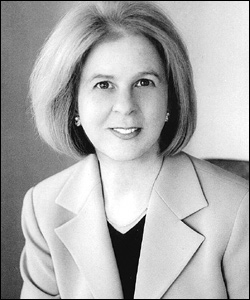Evidence of a major American religious revival is writ large in our current popular culture, says Princeton’s pop-star Bible scholar and National Book Award winner Elaine Pagels, whose Beyond Belief: The Secret Gospel of Thomas is just out in paper (Vintage, $13). Prior to next week’s visit to Seattle, she submitted to an interview by e-mail. “The huge resurgence of interest in issues involving religion is evident not only in Gibson’s The Passion,” she says, “but also in the [6.8] million copies sold of Dan Brown’s The Da Vinci Code.” (Brown has stated that her work helped inspire his best seller.) Religious entertainments aren’t just a niche market anymore, but the source of our biggest hits. Lord of the Rings is a closet Christian allegory, and look for more in the epic film of Tolkien’s pal C.S. Lewis’ The Lion, the Witch, and the Wardrobe, which opens—when else?—Christmas 2005.
While some commentators attribute this resurgence to the increasing cultural and political clout of conservative evangelicals, this view is simplistic. The evangelical revival is part of a larger trend toward a more individualistic, less traditional religious sensibility—one that takes its sermons from Pagels’ books as much as from the Good Book.
Last year, a Harris Company survey said 90 percent of adult Americans believe in God; Gallup reports that 75 percent of Americans pray daily. Yet at the same time, believers are increasingly adapting a smorgasbord approach, blending, say, Christianity with Buddhism. The American Religious Affiliation Survey found that the number of Americans who renounce all extant denominations more than doubled from 1990 to 2001. That diversity of faiths flies in the face of Gibson’s reductive, conservative creed.
IN HER OWN scholarship, Pagels argues that Gibson and company are not speaking the Gospel truth. “Gibson claimed that ‘the holy spirit directed’ the film—and so he made no choices as a director,” says Pagels, “but, in fact, he made a lot of choices—since he had four versions of the trial and death of Jesus to choose from.” Pagels offers other choices: “The discovery in 1945 of the Gospel of Thomas—along with over 50 other Christian gospels and secret writings—and the Gospel of Mary Magdalene shows, to our astonishment, that during the first century there were far more than four gospels circulating among Christian groups.”
So perhaps, like today’s religious rebels, these earliest Christians saw themselves as seekers, not adherents to orthodox creeds. In the year 367, Pagels explains, church authorities decreed that these were “secret and illegitimate gospels,” and ordered all Christians on pain of eternal death to read only the four gospels they approved. They ordered the “Gnostic gospels” destroyed, but some holy dissident hid the papyrus manuscripts in a jar deep in Egypt, where treasure-seeking farmers found them in ’45.
Talk about buried treasure! Pagels’ book reveals a lost world of Christianity, far more in keeping with the questing modern soul than the backward, Taliban-like authoritarian orthodoxy of Gibson’s church fathers. Pagels explains, “Jesus urges his disciples to ‘seek, and you shall find’—to seek God, and their own relationship to God, through a kind of knowledge of the heart.” This Jesus doesn’t claim to be God; he exhorts us to find divinity within, in sayings like this: “If you bring forth what is within you, what you bring forth will save you.”
Pagels’ book shows how the author of John’s Gospel—the canonical one enshrined by the church, recently made into a horribly dull three-hour film—tried to slime and neutralize the parallel Gospel of Thomas, painting him as “Doubting Thomas.” Since the name Thomas literally means “the twin” in Hebrew, Pagels argues that the idea is to become, as it were, Jesus’s identical twin: to find deep within oneself the inspiration to love one’s neighbor as oneself.
Elsewhere, Pagels explicates the Gospel of Mary, which depicts Magdalene not as a prostitute but as Jesus’ spiritual partner. Even the canonical Gospels do not say she was a mattressback; this interpretation was invented by scheming, misogynist church fathers long after. The Da Vinci Code spins this historical slander into a thriller plot involving Paul’s evil heist of the church from Jesus’ wife, Mary. Brown’s novel, says Pagels, “raises the question: If the church did not tell us that Mary Magdalene was not, in fact, a prostitute, what else didn’t they tell us? His book, of course, is a fiction thriller, but my own work as a historian raises the same question—and the answer is ‘a lot!'”
Elaine Pagels will appear at University Temple Methodist Church (1415 N.E. 43rd St., 206-634-3400; free tickets required in advance from University Book Store), 7 p.m. Wed., May 5.








